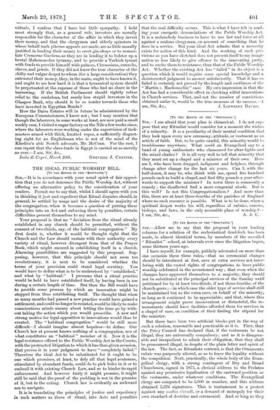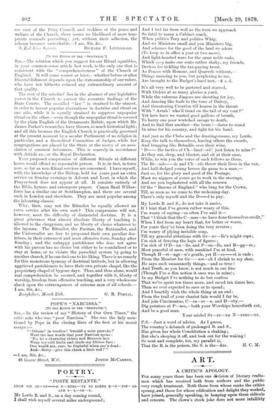[TO THE EDITOR OF THE "SPECTATOR.")
SIR,—Allow me to say that the proposal in your leading columns for a solution of the ecclesiastical dead-lock has been made, in almost identical terms, by members of the so-called "Ritualist" school, at intervals ever since the litigation began, some thirteen years ago.
I have myself, for example, publicly advocated on more than one occasion these three rules,—that no ceremonial changes should be introduced at first, save at extra services not inter- fering with the vested rights of congregations to have public worship celebrated in the accustomed way ; that even when the changes have approved themselves to a majority, they should not be substituted at the principal services of the Sunday until petitioned for by at least two-thirds, if not three-fourths, of the church-goers ;—in which ease the older type of service shall still be maintained but as the extra ones, on behalf of the minority, so long as it continued to bp appreciable; and that, where this arrangement might prove inconvenient or distasteful, the re- monstrants should have facilities afforded them for services in a chapel of ease, on condition of their finding the stipend for the minister.
But there have been two artificial blocks put in the way of such a solution, reasonable and practicable as it is. First, that the Privy Council has declared that, if the vestments be not illegal, they are universally compulsory; and as it is disagree- able and inexpedient to admit their obligation, that they shall be pronounced illegal, in despite of the plain letter and spirit of the law. The fact, as Ritualists contend, is that the Ornaments rubric was purposely altered, so as to leave the legality without the compulsion. Next, practically, the whole body of the Evan- gelical clergy, with a strong contingent of Dry and Broad Churchmen, signed in 1875, a clerical address to the Prelates against any permissive legalisation of the eastward position or the vestments, under whatever conditions. The Evangelical clergy are computed to be 5,000 in number, and this address obtained 5,376 signatures. This is tantamount to a protest against any modes vivencli, or a demand of monopoly for their own standard of doctrine and ceremonial. And so long as they are sure of the Privy Council, and reckless of the peace and welfare of the Church, there seems no likelihood of more tem- perate counsels prevailing ; yet, without their adhesion, the scheme becomes unworkable.—I am, Sir, &c.,



































 Previous page
Previous page